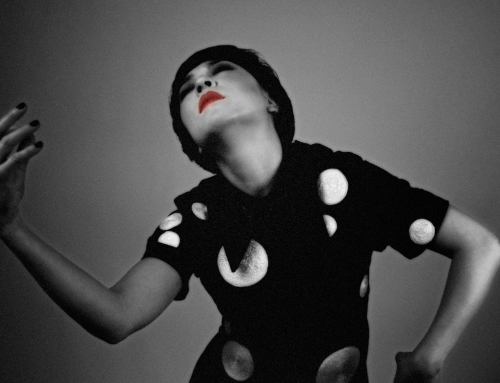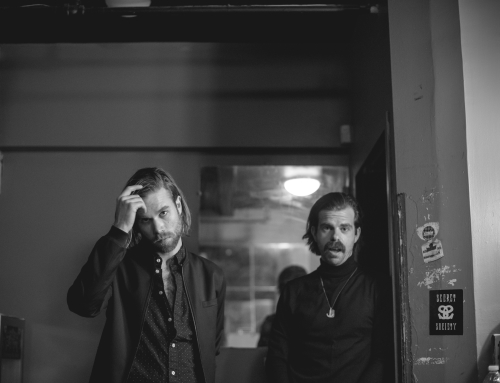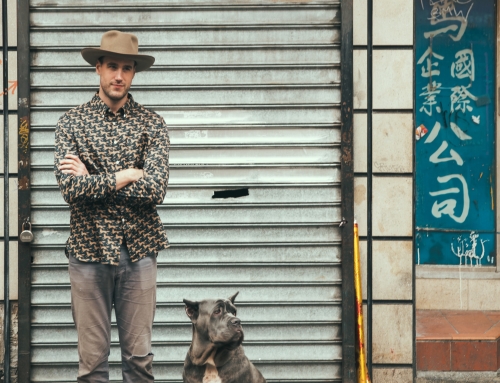From the early days of electronic music in the late ’70s to its modernization and resurgence onto the charts over the last few years by way of indie electronic bands like LCD Soundsystem and EDM stars such as Calvin Harris, singer-songwriter Gary Numan has presided over the genre as a maverick.
The recent release of his album Splinter (Songs from a Broken Mind) this winter, proves once again, that the man who brought electronic music to the mainstream and laid the groundwork for artists like Nine Inch Nails’s Trent Reznor through New Wave hits including “Are Friend’s Electric?” (released while the frontman for Tubeway Army) and “Cars” — considered by music critics, one of the greatest singles of British pop history — doesn’t believe in resting on his laurels.
“A lot of people seem to be coming into electronic music and recreating what we were doing in the late ’70s and early ’80s, but why would you want to do that,” asks Numan rhetorically during his interview with FILLER. “We’ve already done it. Electronic music was, and remains, fascinating for me because it offers an artist the opportunity to explore new things, to create new sounds, things people have literally never heard before.”
With his new album, Numan demonstrates his continuing experimentalism and traverses electronic music’s expanding terrain, laying claim to an undiscovered dark corner, where he has built a gothic sub-genre characterized by rich sonic layers, evocative lyrics and haunting vocals. Below, Numan illuminates the creative process behind Splinter (Songs from a Broken Mind) and the emotional journey that gave way to the music on his new album.

With your new album, you’ve given us this amazing sound, it’s weighty and sonically unique, while still being very much Gary Numan. What’s your journey been like coming to this album?
It’s been rather long and very dark unfortunately. Although I put out a side project album called Dead Son Rising in 2011, Splinter is my first studio album proper since Jagged, which came out in 2006. After Jagged, and for a number of understandable reasons, I found myself diagnosed with depression and I was put on medication for that for a few years. My wife was having similar problems with Post Natal Depression (or Post Partem as you may call it in North America), so we were not good.
It must have been a very difficult time.
Add to that a mid-life crisis, which left me paranoid and terrified about getting old and sick and dying, the birth of our three children over three and a half years (so a total change of lifestyle, which I struggled with I’m ashamed to say), guilt, a big family fall out, etc, etc. Essentially, I got a bit fucked up for a while, which was bad enough, but then the pills to fix that made any and all problems seem irrelevant, so I just drifted along on a little fluffy cloud of “couldn’t give a shit.”
What about your career at that time?
My career was going down the toilet (I didn’t write a song for over four years), my marriage wasn’t far behind, and I was so laid back because of the ‘cure’ for the depression that I just didn’t care. But, as I eventually started to pull myself out of the total mess that my life had become, I found I had a lot of things to deal with, and the best way to deal with them was to write it all down. It’s like therapy in a way except you talk to yourself. Splinter is, for the most part, the process of my dealing with those things.
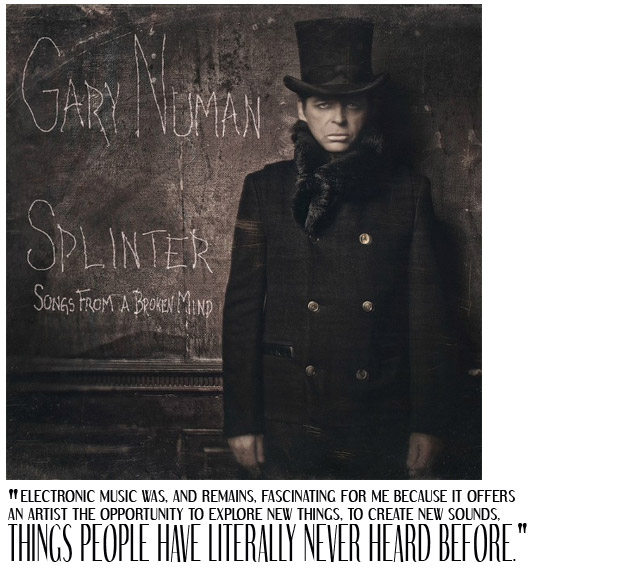
It’s a powerful record; the emotion of the music and lyrics really lingers. In terms of the album’s compositions, they’re very complex. Where did you draw the inspiration for these orchestrations?
Part of my reason for moving to Los Angeles was to see if I had any opportunities, or talents, as a composer for film and TV. I love the album/tour cycle that most of my career has been based on, but I have to think about the future. For me film music would be an interesting and, hopefully, enjoyable challenge. I think that part of the reason for the album having the rather lavish and haunting string parts in places is because I’m already thinking in a more filmic way.
That makes sense, the album feels cinematic. Any other sources of inspiration?
It’s hard to say where inspiration comes from. Each idea opens up a path to several others, and so you go exploring. Sometimes you find yourself in a place that isn’t working and you have to work your way backwards to a point where you were happy with the track, and then start again, on a different path, until you find the parts that make sense for that song. Sometimes it works out straight away. Quite often you have no real idea where it’s going, it’s almost as if you stumble along, relying on instinct. It’s hard to see where inspiration falls within that, but it clearly does, it’s just hard to say what’s inspiring and what’s simply a lucky accident. FInding a sound by chance that transforms a song from average into glorious for example. Was the search for that sound inspired, or was it indeed just a lucky accident? I’ve never known if I’ve been inspired or just lucky. Bit of both I guess.
Your sounds has inspired that of so many bands currently on the scene. But what about yourself, did you drawn any inspiration from other musicians for this album?
One of the things I struggled with initially during the making of Splinter was that I didn’t really have a point of reference for it. Quite often in the past I’ve had key albums by other artists that have become my yard stick, the thing that I’ve tried to make my album measure up to, not sound like, but have the same quality or dynamic in particular areas. With Splinter I didn’t have one, certainly nothing modern anyway.
Why do you think that was?
I realised that no-one, over the last few years, had been making the sort of music I wanted to create. There were things I liked obviously, but no-one was doing anything that was helpful or guiding for me and the album I was trying to make. Very little I heard was useful or relevant and so, along with producer Ade Fenton, I tried to make an album that I wanted other people to be making, music that I wanted to be listening to. We said at one point that if no-one else was going to make it, we’d make it ourselves.
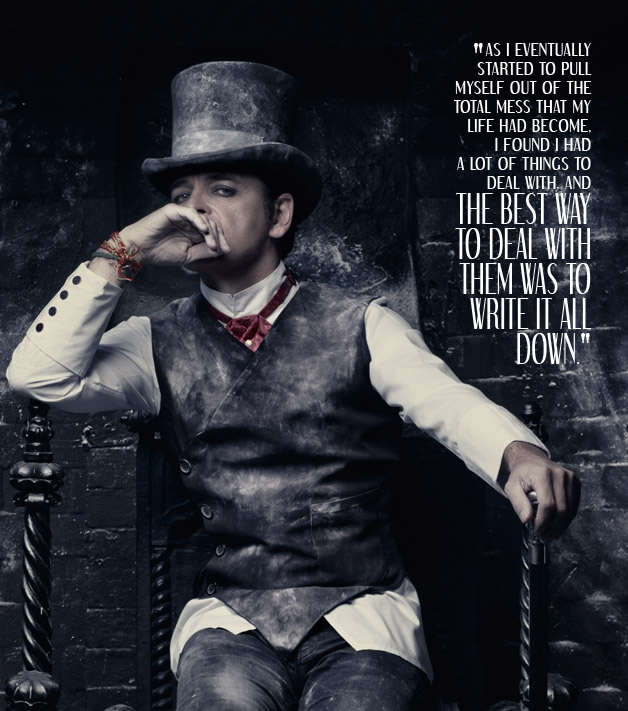
Watch FILLER’s fashion video featuring “I Am Dust” by Gary Numan here.
It’s a singular album I would say.
I’ve noticed many of the reviews have commented on the rather unique sound of the album, the mix of power and emotion with hauntingly gentle moments, the sweeping and variable dynamic that runs through it. That made me very proud because I went into it with a clear vision of what I wanted, but very unsure if anybody else would be interested.
In addition to your own music, you’ve also lent your talents to film scoring and narration. You mentioned an interest in film previously, is it amongst other creative passions you’re tempted to pursue?
The one main thing that I would love to do is write science fantasy novels. I have written so many things over the years, but they have all ended up being converted into songs. Even Splinter has three short story ideas, all part of the book I’m still working on, that have been sucked into music.
Really? Why do you think it always seem to turn into music?
I think part of the problem is I’m scared of finding out I can’t do it, and so I never really start. I write endless notes and ideas down, literally thousands of pages of bits and pieces, but never actually start the story itself. Too scared. But, I have made a promise to myself that I will at the very least make a genuine start in 2014, and if I’m shit, then I’m shit.
You have to try, right?
I don’t want it to be a distant dream anymore, I want to be either a failure or a success. Not in sales terms or money generated, but in personal satisfaction and pride. I may never even try to get anything published, although that really would be a dream come true, but just to write a complete and epic story would be amazing.
As an artist, you never seem to glance backwards at your past, you push progressively forward in your music. Are you a person that generally looks forward as opposed to backwards?
Very much so. Learn from your mistakes, and triumphs I suppose, but don’t dwell on them. I have virtually no interest in what I did yesterday, but I’m incredibly excited about what I might do tomorrow. Yesterday is done, even if it was glorious it’s over. Tomorrow you need to do something new, something special. The excitement in life comes from what’s possible, not what’s been done. I have very little to do with nostalgia, and the little I do is somewhat forced upon me. I have learnt to be proud of my history, but I still don’t want to live on past glories. I’m very excited by the reaction to Splinter, far more so than hearing “Cars” on the radio or used on a TV ad.
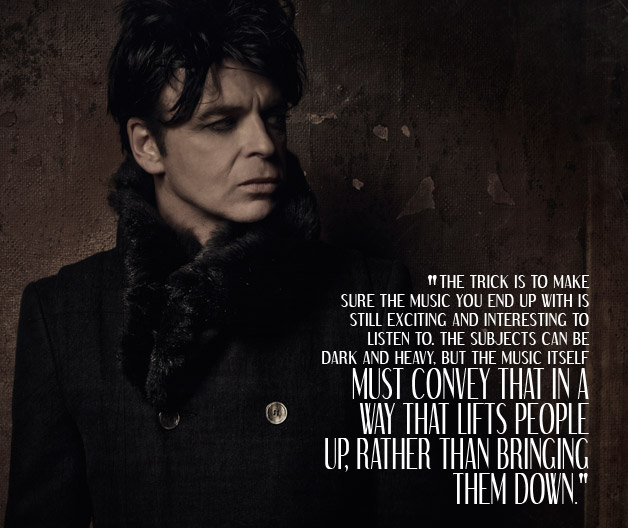
Electronic music is once again at the forefront of music today. What do you think of the evolution of the genre?
I think it’s struggling to keep it’s reputation for being ground breaking and experimental which is a shame. There are, thankfully, still artists who want to push back boundaries and find new sounds, new ways of doing things. But, electronic music has been around long enough now that it’s created it’s own nostalgia. People ask me questions about vintage synths these days and speak of them in hushed tones of wonder, an almost romantic sense of awe in their voices. I hate all that. I stopped using them because the newer machines were better and I’d already got the best out of the older ones. The technology around now is quite phenomenal and it just keeps getting better and ever more powerful. That’s partly why I don’t understand why people would want to come into the genre and then look backwards for their inspiration. But, each to their own. It’s certainly a very healthy genre at the moment, which is a good thing.
Are there any artists currently working in the genre that you would be interested in collaborating with?
I’ve been involved in some very interesting collaborations over the last few years. I did a song with Battles, worked with a new UK band called Officers last year, just done a guest vocal for another British band called Protafield, so I’m often doing things with other people. I don’t really seek it though. I’m a passive collaborator in that I tend to wait for people to ask me. That’s more down to my lack of confidence than anything else. I would never put myself forward for those projects. I have real self-confidence issues unfortunately, which has plagued my entire career.
I understand you live in California now. How has it been adjusting to the never ending sunshine?
I love it here. I’m very happy. My wife Gemma has wanted to live here pretty much since she was born, so she’s happy, the children love the swimming pool and the outdoor lifestyle that the climate here allows, so they’re happy. I do find the people here to be incredibly friendly and as we speak the same language, kind of, it was easy settling in. We were very lucky to find an amazing house quite close to the children’s school, I have a studio in the guest house, so I was able to get on with work soon after we moved here. Coming from somewhere that’s — for most of the year — cold, damp, grey and miserable, living in California feels like a never ending vacation. There will always be things you miss obviously, friends and family, but I’m glad we made the decision to come here, and I’m grateful the Americans let us in.
Has the change in scenery inspired a different variety of song writing at all?
No, that hasn’t happened. I think that’s because all the song writing comes from a small, dark corner of my brain. It doesn’t seem to matter where I am, or what’s going on around me, as it’s only that small dark place that gets creative. If I have a good day, I won’t write about it. If I have a bad day, or I hear about something bad, I will feel a need to start writing it all down. The trick is to make sure the music you end up with is still exciting and interesting to listen to. The subjects can be dark and heavy, but the music itself must convey that in a way that lifts people up, rather than bringing them down. Splinter come from years of depression and huge problems, but it is not a down album at all, quite the opposite. Half of it was written in the UK, half of it in Los Angeles, so it doesn’t seem to matter if it’s sunny outside or not, the things I write are consistent.









